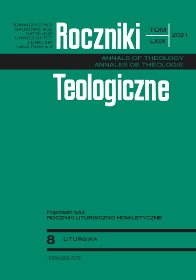Niepokalane Poczęcie Najświętszej Maryi Panny w lex orandi Kościoła w świetle oficjum wotywnego po Soborze Trydenckim
Immaculate Conception of the Blassed Virgin Mary in the Lex Orandi of the Church in the Light of Votive Office Since the Council of Trent
Author(s): Waldemar PałęckiSubject(s): Christian Theology and Religion, Theology and Religion, Pastoral Theology
Published by: Towarzystwo Naukowe KUL & Katolicki Uniwersytet Lubelski Jana Pawła II
Keywords: liturgy; Immaculate Conception of the Blassed Virgin Mary; Votive Office; Council of Trent
Summary/Abstract: The liturgy as theologia prima has played an important role in forming awareness of the truths of the faith which form the foundation of prayer: lex orandi. This reciprocal relationship of lex crednedi−lex orandi was at the foundation of the formulation of the dogma of the Immaculate Conception of the Blessed Virgin Mary in Pope Pius IX's bull of December 8, 1854, Ineffabilis Deus. While this feast was celebrated once a year, a more frequent opportunity to celebrate this mystery−even weekly−was provided by the votive office, which was introduced into the Officium Divinum in 1727, and after the proclamation of the dogma in 1854, new texts were ultimately approved in 1863. The votive office was removed in 1912. The liturgical texts have permitted presenting the mystery of the Conception of the Blessed Virgin Mary in the lex orandi of the Church since the Council of Trent. They emphasize the close relationship between the Immaculate Conception and the virginal maternity of Mary. From eternity Mary had been prepared by God Himself as a pure dwelling place for His Son. In receiving this privilege from God, Mary did not lose her virginity. It was therefore important to show the beauty of Mary against the background of the mystery of original sin and the promise of the protoevangelium of the Book of Genesis. This idea was emphasized in the office by texts from the Book of Wisdom and the Song of Songs, as well as texts from the Fathers of the Church. In praising the Virgin Mary with the words of the votive office, her intercession is entreated for everyday life, and also for help in striving for salvation. Reading and meditating on the liturgical texts thus shapes a proper perception of devotion to Mary in the tradition of the Western Church.
Journal: Roczniki Teologiczne
- Issue Year: 68/2021
- Issue No: 8
- Page Range: 75-93
- Page Count: 19
- Language: Polish

